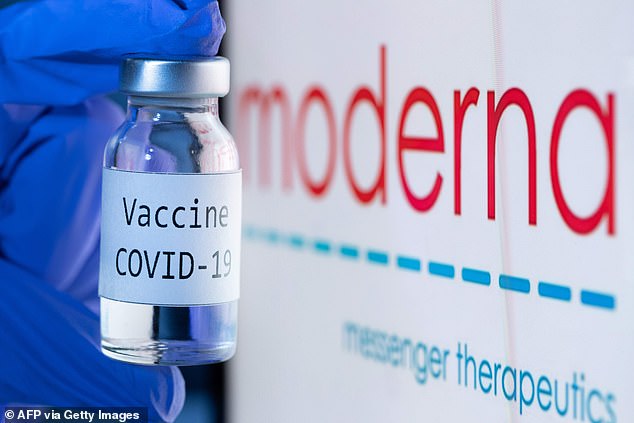Moderna CEO says they can ‘comfortably’ make 500 million doses of its COVID-19 vaccine in 2021 – but will need more resources to hit their goal of 1 billion
- Moderna CEO Stephane Bancel said the firm is ‘very comfortable’ it can can make 500 million dose of its vaccine in 2021 at a Friday Nasdaq event
- But he said it will require ‘more resources’ to make one billion doses of the shot
- He said last month that the firm could produce between 500 million and its ideal one billion doses of the vaccine next year
- Moderna reaffirmed on Thursday it can ship 20 million doses of its shot to the US in 2020
- It comes after Pfizer admitted it will only meet half its production goal this year, delivering 50 million shot doses worldwide, instead of 100 million
- Moderna’s vaccine trial participants still have antibodies to the virus at least three months after their second dose, a new study shows
Moderna is ‘very comfortable’ making 500 million doses of its coronavirus vaccine next year – the firm is unlikely to hit the one billion upper-bound of its production goal for 2021, its CEO said Friday.
Stephane Bancel said at a NASDAQ event that Moderna will require ‘more resources’ to produce the billion doses it hopes to make.
However, the company reaffirmed on Thursday that it will make its goal of producing 20 million doses of its COVID-19 vaccine for the U.S. by the end of 2020.
Both announcements followed Pfizer‘s admission that it will not hit its 2020 goal of 100 million doses worldwide, instead promising 50 million, enough to vaccinate 25 million people with the two-dose regimen.
Moderna’s coronavirus vaccine was also shown to likely protects people for at least three months in a new National Institutes of Health (NIH) study published Thursday.
Moderna is on track to meet the lower end of its goal of making 50 million doses of coronavirus vaccine in 2021 – but will need ‘more resources’ to hit its loftier aim of 1 billion doses, CEO Stephane Bancel said Friday
Participants who got injected for the firm’s phase 1 safety study earlier this year still had antibody levels well above baseline three months after they got their second booster shot of the vaccine, the new National Institutes of Health (NIH) study found.
Moderna’s vaccine was 94.5 percent effective at preventing COVID-19 in its final trial before it applied for emergency Food and Drug Administration (FDA) approval on Monday.
The latest study offers hope that the two-dose shot regimen will keep working for months after the second one is given, which could prevent more infections and spare the U.S. the cost of repeated rounds of vaccination.
It’s a double-win for Moderna, which also reaffirmed on Thursday that it will be able to deliver 20 million doses of its vaccine to the U.S. by year-end after Pfizer admitted it will only be able to distribute 50 million doses – half its promised 100 million – worldwide the end of 2020.
Moderna initially vaccinated 34 healthy adults aged 18 and older in March, simply to test the safety of the coronavirus vaccine they were developing – not to test whether it works.

Stephane Bancel said the company is ‘comfortable’ making 500 million doses next year during a Nasdaq event
About two months (57 days) after the participants’ first doses, researchers followed up with the group and found that they were not having serious side effects from the vaccine, a critical sign that it wasn’t dangerous.
They also tested the group’s blood and found hints that the vaccine might be working.
Vaccinated people, they found, had developed even higher levels of antibodies and immune cells to fight the virus than people who had recovered from COVID-19 itself.
But there was no telling how long the antibodies would stick around, or if the coronavirus would remain in the immune memory of those who were vaccinated.
Three months, or 119 days, after the second booster dose of the vaccine (thought to be key to protection), those 34 participants still had elevated antibody levels, the new study published in the New England Journal of Medicine (NEJM) reveals.
In fact, their levels of neutralizing antibodies thought to block the virus from entering human cells were higher than the levels seen in the blood of 41 recovering patients, bout 34 days after the survivors were diagnosed.

Levels also stayed in people of all ages.
As we age, our immune systems become weaker and slower, so they are less adept at ramping up a defense to fight off infections.
That’s one of the reasons that coronavirus has proven so deadly for seniors.
It also means that vaccines – which are designed to teach the body to combat a particular pathogen by triggering an immune response – often don’t work as well in older people.
Unsurprisingly, antibody levels were about 55 percent higher in people ages 18 to 55, compared to those between 56 and 70 and 49 percent higher than antibody levels seen in people 71 and older.
But they were still very much present and detectable, suggesting the patients would still likely have some protection against coronavirus.
